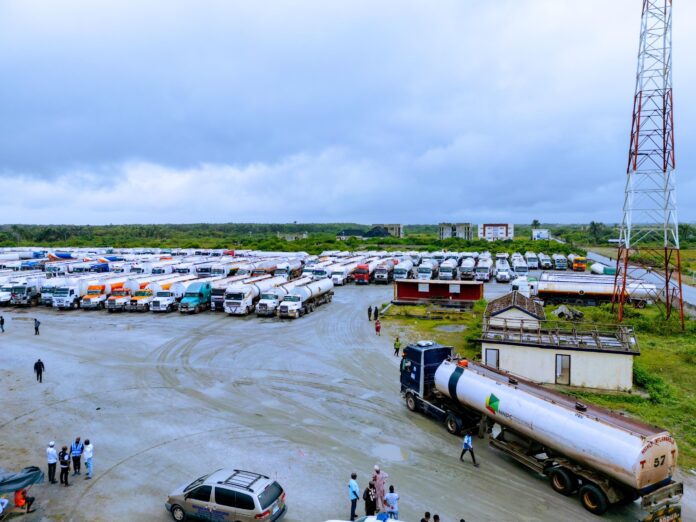The Nigerian National Petroleum Company Limited (NNPCL) has officially ended its long-standing practice of importing refined petroleum products, now sourcing all fuel from local refineries, including the Dangote Petroleum Refinery.
This significant development was announced by the NNPCL Group Chief Executive Officer, Mele Kyari, on Monday during the Nigerian Association of Petroleum Explorationists conference in Lagos.
Kyari revealed that the company no longer relies on imported fuel, marking a major shift in Nigeria’s energy landscape.
“Today, NNPC does not import any product. We are taking only from domestic refineries,” Kyari said, confirming the company’s new approach to fuel sourcing.
A Historic Shift in Fuel Supply
For years, Nigeria’s fuel sector has been dependent on imports to meet local demand. However, the shift to purchasing fuel from local refineries, particularly the Dangote Refinery, is a crucial step towards self-sufficiency in the country’s energy sector.
Kyari expressed his pride in NNPCL’s role as part-owner of the Dangote refinery, highlighting the strategic business decision to supply crude oil to local refineries rather than importing refined products.
“We are very proud part-owners of Dangote refinery, no doubt about it,” Kyari said. “We saw an opportunity that there is a clear market for at least 300,000 barrels of our production. As time moves on, people will start struggling to find markets for their production. It’s already happening.”
This move, Kyari explained, is not just about meeting domestic demand but also securing a stable market for Nigerian crude oil.
The Role of Dangote Refinery in Fuel Supply
The Dangote Refinery, one of Africa’s largest, is set to play a pivotal role in ensuring Nigeria’s fuel supply is self-sustaining. NNPCL’s partnership with the refinery has opened a new chapter in the country’s petroleum industry.
Kyari emphasized that the decision to supply crude to domestic refineries, including Dangote, is based on informed business considerations.
“We knew from day one that it is to our benefit to supply crude oil to the domestic refinery. We don’t need to be persuaded; we are already doing this,” he added.
This marks a decisive break from Nigeria’s history of relying on international refineries for the bulk of its fuel supply.
Nigeria’s ‘Lamborghini Crude’ and High Refining Costs
Kyari also addressed concerns about the high cost of refining Nigerian crude, which is often referred to as “Lamborghini crude” due to its premium quality.
According to Kyari, the high quality of Nigerian crude means that the refined products are typically more expensive than those made from other crude types. He explained that while global dealers sometimes mix Nigerian crude with lower-quality oil to reduce costs, the country’s refined products remain costly.
“Nigerian crude is Lamborghini crude. So, the products will be pricey,” Kyari stated.
Despite this, Kyari remains optimistic about Nigeria’s ability to meet its own fuel needs through domestic refining.
IPMAN Partners with Dangote Refinery
Meanwhile, the Independent Petroleum Marketers Association of Nigeria (IPMAN) has also secured an agreement with Dangote Group to lift refined petroleum products directly from the Dangote Refinery.
The IPMAN National President, Abubakar Garima, confirmed this partnership, assuring Nigerians that the deal would guarantee a steady and affordable supply of Premium Motor Spirit (PMS) products nationwide.
“The agreement with Dangote Refinery will ensure steady and affordable supply of PMS products across the country,” Garima announced to the press after a meeting with the National Working Committee of the association.
This collaboration between IPMAN and Dangote Refinery is expected to help stabilize fuel supply and pricing in Nigeria, a country that has long struggled with fuel shortages and price volatility.
The End of Importation: What It Means for Nigeria
The end of fuel importation by NNPCL marks a milestone in Nigeria’s efforts to become self-sufficient in petroleum production and refining.
With the Dangote Refinery now operational and local refineries receiving crude oil directly from NNPCL, the hope is that Nigeria will reduce its dependency on foreign refined products.
Kyari’s announcement signals a shift toward a more sustainable and independent fuel market, though challenges remain in ensuring that domestic refineries can meet the full demand of the country.
As the government moves forward with this initiative, Nigerians are hopeful that the elimination of imports will lead to more stable fuel prices and fewer fuel shortages.

